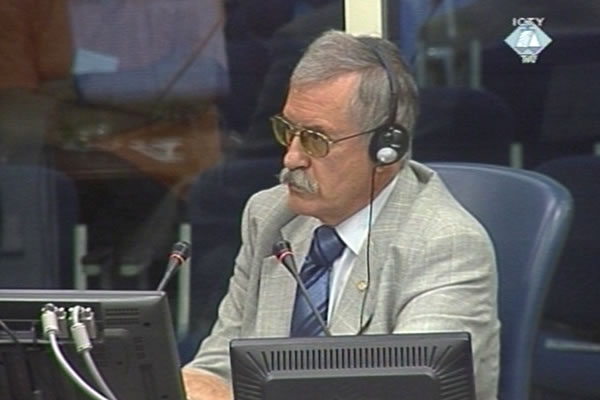Home
GENERAL TAKING COVER BEHIND A NCO
With the evidence of former HV War School commander Mladen Barkovic, the defense of Ante Gotovina is trying to prove that it was difficult to maintain discipline among the units in the liberated territory after Operation Storm, primarily because there was a shortage of well trained non-commissioned officers
 Mladen Barković, svjedok odbrane Ante Gotovine
Mladen Barković, svjedok odbrane Ante Gotovine The defense argues that Ante Gotovina could not rely on his non-commissioned officers to discipline soldiers after Operation Storm in the summer of 1995. The reason, as former commander of the HV War School Mladen Barkovic said in his evidence in Gotovina’s defense, was a shortage of good non-commissioned officers. The existing NCOs were not well trained. According to Barkovic, the main reason was insufficient time to train the NCOs; the state and its military were formed in 1991, in wartime, and this situation went on until Operation Storm. Generals Gotovina, Cermak and Markac are charged with crimes committed then.
The witness maintains that discipline was most difficult to maintain among the Home Guard units, formed mostly by displaced Croats: in the liberated territories they saw the destruction of their houses and sought revenge by burning the abandoned Serb property. As Barkovic put it, the HV War School paid special attention to training its students in principles of the international law of war. Documents presented by the defense show that from 1992 to 1995 the International Red Cross staff regularly came to lecture the students on that topic. The emphasis was put on the treatment of civilians and prisoners of war based on the Geneva conventions.
In his cross-examination, prosecutor Russo argued that the HV non-commissioned officers were not undereducated to the extent that Gotovina’s defense was trying to paint it. The best proof for that, the prosecution alleges, is the military success of Operation Storm. The ‘HV backbone’, as the witness called the NCOs, played a special role. Barkovic agreed with the claim that the attack against Knin was ‘conducted fairly well’ and that the chain of command functioned well, particularly in light of low expectations the operation command had in that respect.
Because he knew that the HV troops committed crimes in Glamoc and Bosansko Grahovo immediately before Operation Storm, General Gotovina had to foresee that it could happen in the villages and towns in Krajina, the prosecution argues. Gotovina probably ‘could guess’ that there might be some looting and burning down of Serb houses, the witness said, but every military attack carried a ‘certain risk’, he added. In an effort to prove that the accused general did nothing to keep that ‘risk’ to a minimum, the prosecution tendered into evidence several documents drafted by the Split Military District. Those documents show that many HV members were promoted and awarded after entering Grahovo and Glamoc; none were disciplined for numerous incidents of looting and arson. Whoever wanted to commit crimes in the future could clearly see that their crimes would go unpunished.
In an attempt to illustrate the discipline in Croatian units during Operation Storm, the prosecution showed some excerpts from the 6th Home Guard Regiment war logbook: as they entered various villages in Krajina they sang an Ustasha song. Barkovic said that there was such low-grade extremism among some HV troops. However, Barkovic noted, the War School emphasized the difference between Croatia and the Ustasha movement in Homeland Education, taught as a special subject.
Linked Reports
- Case : Gotovina et al. - "Operation Storm"
- 2009-07-09 US MILITARY ATTACHE IN GOTOVINA'S DEFENSE
- 2009-07-07 CLEARING UP AFTER OPERATION STORM
- 2009-07-03 A THOUSAND QUESTIONS ABOUT A THOUSAND CRIMINAL REPORTS
- 2009-07-17 WHEN LITTLE KIDS PLAY WAR…
- 2009-07-23 GOTOVINA’S MILITARY WITNESS ON ‘ASSUMED FACTS’
- 2009-08-18 SOLANA’S NEW LETTER
